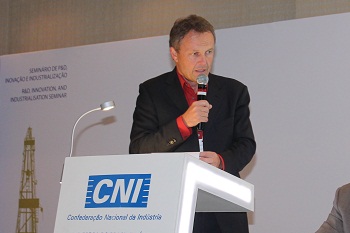“Detailed requirements and regulations can endanger the collaboration everyone says they want so badly”, warns Kjetil Solbrække, CEO of Instituto Sintef do Brasil.
How to improve the R&D cooperation between Norway and Brazil, was one of the topics discussed during a seminar on research and development in Rio de Janeiro from November 25-27, 2013.
On November 25, a Memorandum of Understanding on R&D collaboration was signed by Norway and Brazil, and the Norwegian Deputy Minister of Petroleum and Energy, Kåre Fostervold, assured that there is a strong political will to broaden the collaboration with Brazil within R&D, industrialization and innovation.
Read more: Norway and Brazil sign MOU on R&D
Obstacles
But today there are several obstacles for researchers and institutions willing and trying to cooperate, and some of them were outlined in a presentation by Kjetil Solbrække, CEO of Instituto Sintef do Brasil, on November 26.
 Mr. Kjetil Solbraekke is also a board member of the NBCC.“Requirements, challenging accounting rules and tax regulations do not facilitate the cooperation that everyone says they want. We need to encourage the politicians to keep working and try to solve these challenges thru clear, bilateral agreements. Our countries have so much to share”, Mr. Solbrække (photo on the left) said in his presentation.
Mr. Kjetil Solbraekke is also a board member of the NBCC.“Requirements, challenging accounting rules and tax regulations do not facilitate the cooperation that everyone says they want. We need to encourage the politicians to keep working and try to solve these challenges thru clear, bilateral agreements. Our countries have so much to share”, Mr. Solbrække (photo on the left) said in his presentation.
He gave several examples on problems that Instituto Sintef do Brasil has had to cope with. Taxation on research services is one. The difficulties in using researchers in Norway for shorter periods of time, is another. As a result, time passes and costs increase.
“Does it make sense to add a 48% tax on R&D services? On the contrary, it makes cooperation more difficult and more costly to the clients. We need more flexibility from institutions like ANP and The Reasearch Council of Norway. We need to define the rules of the game, and hopefully, we´ll get better results at a cheaper cost by collaborating.”
Mr. Solbrække said the research community has to demonstrate more clearly why it makes sense to cooperate.
“Nothing happens by itself. We have to show what we can gain by cooperating and challenge our politicians. We have heard strong political will during the seminar, and seen that there are funds available. About 150 years ago, Norway and Brazil signed an agreement on exchanging coffee for bacalhau. It should be easier to reach an agreement on R&D services, but I´m not sure”, Mr. Solbrække said.
Broad alliance
The R&D seminar was organized by the SINOS alliance, a group of Norwegian universities and research institutions, in cooperation with CNI, and it took place at the Sheraton hotel in Rio de Janeiro from November 25-27, 2013.
The SINOS alliance consists of The Norwegian University of Science and Technology (NTNU), The University of Oslo (UIO), Institute for Energy Technology (IFE), Sintef Norway and Instituto Sintef do Brasil.
The signing of the MOU on November 25, was the highlight of the event. Deputy Minister of Petroleum and Energy, Kåre Fostervold, represented the Norwegian government and Vice-Minister of Research, Technology and Innovation, Mr. Luis Antônio Elias, represented the Brazilian side.
 New opportunities
New opportunities
On November 25, Solange Guedes, a Petrobras Corporate Executive, and Tathiany R. Moreira de Camargo, Deputy Manager of Research and Technological Development in the ANP, were among the main speakers.
Solange Guedes (in the middle in the photo) talked about how R&D shapes the E&P industry today.
“The pre-salt developments will create new opportunities for the research community. Petrobras has a strategy of open innovation, where new technolgies are developed in Brazil thru key partnerships, in Brazil and abroad. This gives us the opportunity to expand our research and innovation capacity, and partnerships with R&D institutions and universities are the pillars of the strategy”, she said.
According to Tathiany R. Moreira de Camargo (to the right in the photo), the ANP sees a great need for innovation in order to move the Brazilian oil and gas sector forward. She also talked about the R&D clause, requiring that producing companies invest 1 percent of the gross revenue in R&D.
“Our perspective is that 26 billion reais will be allocated to R&D by 2022. But we believe that Brazil can´t do this alone, and we need to attract international companies, exchange information and capacitate our personnel. International cooperation on R&D is a key factor to overcome current and future challenges”, she said.

Funding
The participants on the seminar were also informed about available funding schemes from institutions like Innovation Norway, the Research Council of Norway and Finep in presentations by Helle Moen, Siri Helle Friedmann and Rogério Medeiros.
Exchange programs for researchers and students between Norway and Brazil were also discussed.
On November 27, the participants discussed the challenges and opportunities for developing new technologies in Brazil and how to develop local competence and high tech suppliers in Brazil.
Read more: Norway and Brazil sign MOU on R&D
By Runa Hestmann Tierno, NBCC journalist
(runa.tierno@nbcc.com.br)
:


